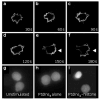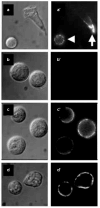A PtdInsP(3)- and Rho GTPase-mediated positive feedback loop regulates neutrophil polarity
- PMID: 12080346
- PMCID: PMC2823287
- DOI: 10.1038/ncb811
A PtdInsP(3)- and Rho GTPase-mediated positive feedback loop regulates neutrophil polarity
Abstract
When presented with a gradient of chemoattractant, many eukaryotic cells respond with polarized accumulation of the phospholipid PtdIns(3,4,5)P(3). This lipid asymmetry is one of the earliest readouts of polarity in neutrophils, Dictyostelium discoideum and fibroblasts. However, the mechanisms that regulate PtdInsP(3) polarization are not well understood. Using a cationic lipid shuttling system, we have delivered exogenous PtdInsP(3) to neutrophils. Exogenous PtdInsP(3) elicits accumulation of endogenous PtdInsP(3) in a positive feedback loop that requires endogenous phosphatidylinositol-3-OH kinases (PI(3)Ks) and Rho family GTPases. This feedback loop is important for establishing PtdInsP(3) polarity in response to both chemoattractant and to exogenous PtdInsP(3); it may function through a self-organizing pattern formation system. Emergent properties of positive and negative regulatory links between PtdInsP(3) and Rho family GTPases may constitute a broadly conserved module for the establishment of cell polarity during eukaryotic chemotaxis.
Conflict of interest statement
Competing Financial Interests: The authors declare that they have no competing financial interests.
Figures




Comment in
-
Leading the way.Nat Cell Biol. 2002 Jul;4(7):E171. doi: 10.1038/ncb0702-e171. Nat Cell Biol. 2002. PMID: 12105427 No abstract available.
References
Publication types
MeSH terms
Substances
Grants and funding
LinkOut - more resources
Full Text Sources
Other Literature Sources
Research Materials
Miscellaneous

